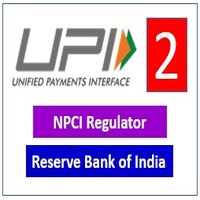First times, UPI was launched in 2016. Unified Payments Interface (UPI) is an instant real-time payment system developed by National Payments Corporation of India facilitating inter-bank transaction.
The interface is regulated by the Reserve Bank of India (RBI) and works by instantly transferring funds between two bank accounts on a mobile platform.
The UPI mandate could be used in a scenario where money is to be transferred later by providing commitment at present.

National Payments Corporation of India (NPCI) has upgraded unified payments interface (UPI) with enhanced security features and overdraft facilities.
UPI allows us to pay directly from bank account to different merchants without putting details of card details, net banking, IFSC code, wallet password etc. Since it is standardised across banks, the transaction is hassle free. te transaction which can be done using UPI include Merchant payments, remittances, bill payments and so on.
UPI 2.0 Now Official
- UPI 2.0, an upgraded version of National Payments Corporation of India (NPCI)’s Unified Payment Interface, was announced with several features.
- Reserve bank of India (RBI) Governor Urjit Patel formally launched UPI 2.0 in the presence of select members from banks and the NPCI in Mumbai.
Features of UPI 2.0
- UPI 2.0 let’s customers link their overdraft (OD) account with UPI. With the initial version of UPI, customers could only connect their saving and current accounts to the payment interface.
- The upgraded UPI 2.0 allows scheduling payment transfers at a later date. For this feature to work, pre-authorisation over transaction is required.
One-Time Mandate
- UPI mandate could be used in a scenario where money is to be transferred later by providing commitment at present. UPI 2.0 mandates are created with one-time block functionality for transactions. Customers can pre-authorise a transaction and pay at a later date.
- It works seamlessly for merchants as well as for individually users. Mandates can be created and executed instantly. On the date of actual purchase, the amount will be deducted and received by the merchant/individual user.
UPI is Unique
- The UPI is an improved version of IMPS. It just requires a bank account and a Smartphone. A user is provided with a unique ‘virtual address’ after registering for UPI with the bank.
- This virtual address is mapped to the user’s Smartphone. UPI works on a single-click 2 factor authentication.
National Payments Corporation of India (NPCI)
- Founded in 2008, NPCI is a non-profit organisation registered under section 8 of the Companies Act 2013.
- The organisation is owned by a consortium of major banks and has been promoted by the country’s central bank, the Reserve Bank of India. Its recent work of developing Unified Payments Interface aims to move India to a cashless society with only digital transactions.
- Currently there are 10 bank core promoters of NPCI, namely – State bank of India, Punjab National Bank of India, Canara Bank, Bank of Baroda, Union Bank of India, Bank of India, ICICI Bank, HDFC Bank, Citibank India, HSBC Bank India.
Recent Achievement of NPCI
- Unified Payment Interface (UPI) – Single mobile application for accessing different bank accounts.
- RuPay – Card Scheme
- BharatQR – A common QR code built for ease of payments
- BHIM app
Notes about UPI
- The first version of UPI was launched on April 11, 2016 and in the last two years, the platform has emerged as a popular choice among users for sending and receiving money.
- BHIM UPI has recorded transactions worth Rs. 45,845 crore and 235 million in terms of value and volume in the month of July 2018.
Previously asked question In UPSC 2017
Question 1. Which of the following is a most likely consequences of implementing the ‘Unified Payments Interface (UPI)‘?
- Mobile wallets will not be necessary for online payments.
- Digital currency will totally replace the physical currency in about two decades.
- FDI inflows will drastically increase.
- Direct transfer of subsidies to poor people will becomes very effective.
Question 2. Consider the following statements:
- National Payments Corporation of India (NCPI) helps in promoting financial inclusion in the country.
- NPCI has launched RuPay, a card payment scheme.
Which of the statements given above is/are correct?
(a) 1 only
(b) 2 only
(c) Both 1 and 2
(d) Neither 1 nor 2
Answer
Question 1 – 1. Mobile wallets will not be necessary for online payments.
Question 2 – (c) Both 1 and 2
UPSC Prelims 2018
Question 3. Which one of the following links all the ATMs in India?
a). Indian Bank’s Association
b). National Securities Depository
c). National Payments Corporation of India
d). Reserve Bank of India
Question 3 – c). National Payments Corporation of India
All the best for your upcoming exam!
You can join or visit at Facebook Page or Twitter for always keep in touch with further updates.
Read more articles….
